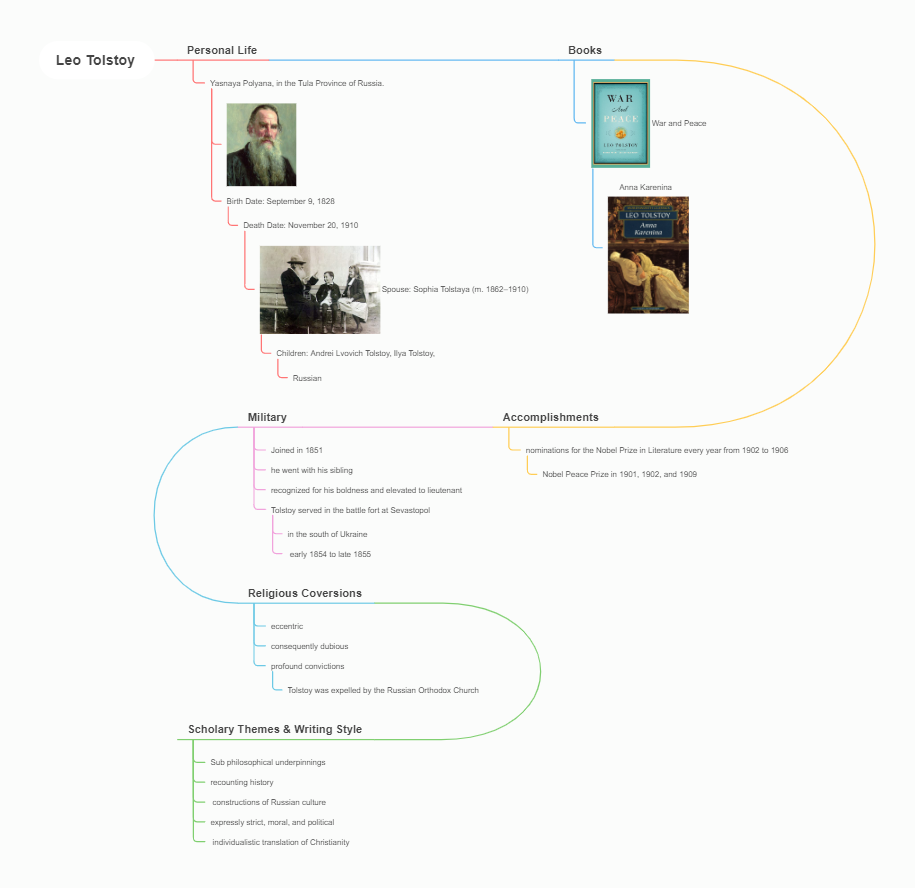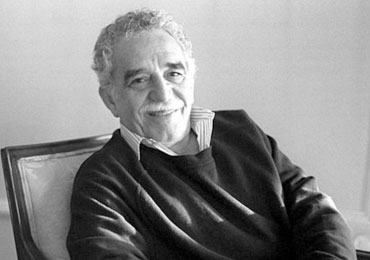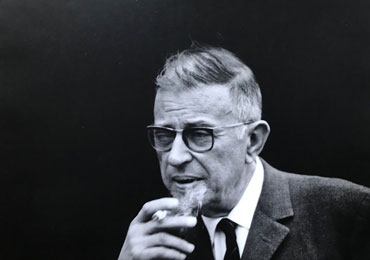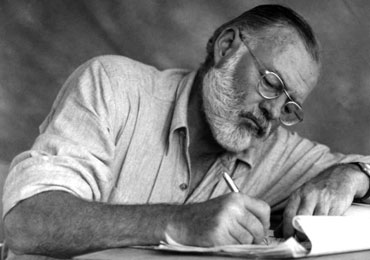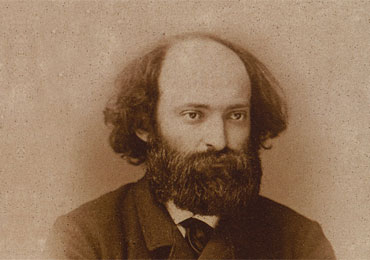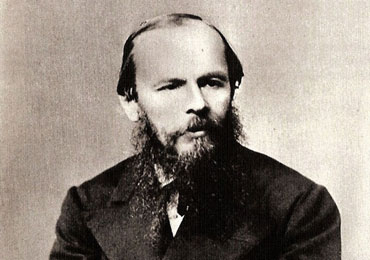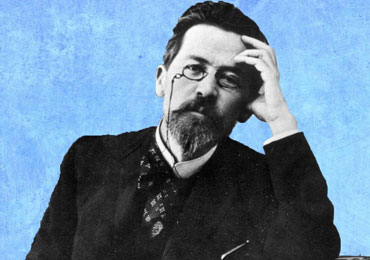Leo Tolstoy (Books, Quotes, Facts, & Mind Maps)
Leo Tolstoy was born at Yasnaya Polyana, the place for his family's heritage, on August 28, 1828, in one of Russia's Province named Tula. Leo was the youngest of four siblings. His mother left the world when Leo was just around two years old. From that point onward, his father's first cousin Tatyana Ergolsky accepted accountability for the children. In 1837 Tolstoy's father left the world too, and after that, an aunt named Alexandra Saken became a legitimate guardian of the Tolstoy children. Her fierce commitment was a critical early impact on Tolstoy. When she died in late 1840, the children were transported off to Kazan, Russia, to Pelageya Yushkov, who was another sister of their father.
Early Life
German and French mentors homeschooled Tolstoy. He was not an incredibly exceptional understudy, but he was acknowledged at games rather than all things considered. He got admission to Kazan University in 1843. Expecting an optional calling, he joined the staff of Oriental vernaculars and dialects. Looking at these assessments exorbitantly mentioning, he traded two years sometime later to thinking about law. Tolstoy dropped out of the university in 1847 without completing his degree.
Tolstoy returned to his hometown Yasnaya Polyana and made plans to transform into a model farmer and a "father" to his farmers. His establishment failed because of his ridiculousness in dealing with the farmers. Since he contributed an unreasonable measure of energy partner in Tula and Moscow’s cities, he at first began making unimaginably authentic diary areas during this time, a preparation he kept up until his passing. These areas gave a ton of material to his fiction, and irrefutably the grouping was one long close to home history.
Ventures and Military Experience
Tolstoy's excursion from licentious blue blood to socially unsettling essayist was formed vigorously by a couple of encounters in his childhood, specifically, his military help and his movements in Europe. In 1851, after adding to binding obligations from betting, he went with his sibling to join the military.
Even though he was recognized for his boldness and elevated to lieutenant, Tolstoy did not care for his military help. The frightful savagery and hefty loss of life in the war alarmed him, and he left the military straightaway after the war finished. Alongside a portion of his countrymen, he set out on voyages through Europe: one out of 1857 and one from 1860 to 1861.
Tolstoy served in the battle fort at Sevastopol in the south of Ukraine. He had mentioned the move to this territory, a sight of perhaps the Crimean War's bloodiest skirmish from early 1854 to late 1855. As he coordinated fire from the Fourth Bastion, the hottest zone in the contention for quite a while, Tolstoy figured out how to compose Youth, the second piece of his set of three. He has likewise written the three Sevastopol Tales as of now, uncovering the unmistakable Tolstoyan vision of battle as a position of unrivaled disarray and courage, a unique space where men, seen from the creator's nonpartisan, divine perspective, were at their best and most noticeably terrible.
At the point when the city got destroyed, Tolstoy was approached to do an investigation of the ordnance activity during the last attack and to report everything to the upper ups in St. Petersburg, Russia. His co-workers and friends in the capital were a victorious achievement. Because of his being famous, he was invited into a prestigious and most splendid society. As a result of his accounts, he was treated and watched as one of the scholarly community’s big names.
Reasoning and Religious Conversion
Despite Anna Karenina's achievement, following the novel's fulfillment, Tolstoy endured an otherworldly emergency and became discouraged. Attempting to reveal the importance of life, Tolstoy originally went to the Russian Orthodox Church yet didn't discover the appropriate responses he looked for there. He came to accept that Christian chapels were terrible and, instead of coordinated religion, built up his convictions. He chose to communicate those convictions by establishing another distribution called The Mediator in 1883.
As a result of embracing his eccentric — and consequently dubious — profound convictions, Tolstoy was expelled by the Russian Orthodox Church. The mysterious police even watched him. At the point when Tolstoy's new beliefs provoked his longing to part with his cash, his significant other emphatically protested. The difference put a strain on the couple's marriage until Tolstoy hesitantly consented to a trade-off: He surrendered to conceding his considerable other the copyrights — and probably the sovereignties — to the entirety of his composing originating before 1881.
Books
In his previous works, Tolstoy was to a great extent worried about portraying what he saw around him on the planet, especially at the convergence of general society and private circles. War and Peace and Anna Karenina, for example, both recounted epic stories with genuine philosophical underpinnings. War and Peace invested enormous energy reprimanding the recounting history, contending that it's the more modest occasions that impact the world forever, not the extraordinary circumstances and acclaimed saints. The plot of war and peace goes around the time when the forces of Napoleon invaded Russia in the year 1812. The story's main character is a young man known as Pierre Bezukhov as he proceeds to fight for the estate and money from his father.
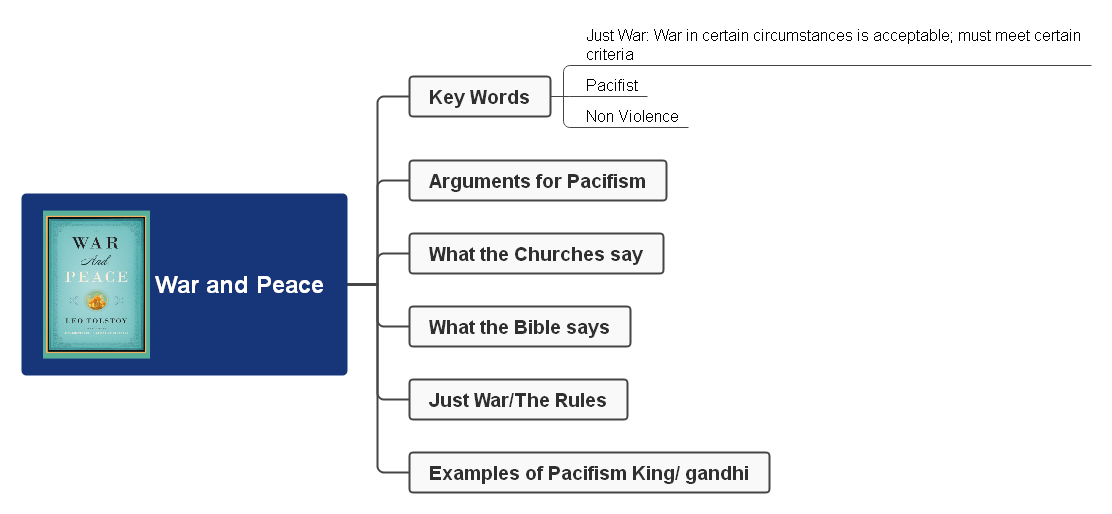
Anna Karenina, then, focuses on close-to-home topics like selling out, adoration, desire, and envy, just as turning a nearby eye on the constructions of Russian culture, both in the higher classes of the nobility and among the proletariat. This book's genre is relatively sad yet heart-capturing as this is the story of two people known as Anna Karenina and Count Vronsky. The whole plot goes around the two characters and their strong desires in life in contrast to strict rules and responsibilities towards their roles in society. The story has other lovable characters like dolly and kitty as well.

Sometime down the road, Tolstoy's compositions brought a transform into the expressly strict, moral, and political. He finally expounded on his pacifism and disorder hypotheses, which integrated with his profoundly individualistic translation of Christianity. Tolstoy's writings from his later times were no longer books with academic subjects, yet clear articles, compositions, and other verifiable work. Plainness and crafted by internal flawlessness were among the things Tolstoy supported in his designs.
Tolstoy did, nonetheless, get politically included or possibly freely communicated his suppositions on significant issues and clashes of the day. He wrote on the Boxer rebels' side during the Boxer Rebellion in China, criticizing the Russian, American, German, and Japanese soldiers’ viciousness. He composed on upheaval, yet he thought of it as an inner fight to be battled inside singular spirits instead of a brutal topple of the state.
Throughout his life, Tolstoy wrote in a wide assortment of styles. His most renowned books contained clearing composition somewhere close to the pragmatist and innovator styles, just as a specific style of flawlessly clearing from semi artistic, definite however enormous depictions to the particulars of characters' points of view. Afterward, as he moved away from fiction into genuine, his language turned out to be all the more excellent and philosophical.
Facts
There are a lot of facts about Tolstoy that most people don’t know. Tolstoy was a man full of energy and high will to improve himself as an individual on a daily basis. He highly believed in self-improvement, which is why he also used to write journals. In addition to that, everyone knows how Tolstoy’s marriage failed miserably; however, few people know that both he and his wife had a good understanding of the initial years of marriage. She also helped Tolstoy write the climax of War and piece. The other fact about Tolstoy was his excommunication by the Russian Orthodox Church. The main reason he got excommunicated was his questioning of the beliefs and teachings of Jesus Christ in 1901. With his variant questioning of cults and other people being influenced by his active thinking, even influential people like Gandhi were affected by his ideology.
Death
Before the finish of his life, Tolstoy had arrived at a limit with his convictions, family, and wellbeing. He, at last, chose to isolate himself from his significant other, Sonya. She energetically restricted a considerable lot of the thoughts and was incredibly envious of the consideration he gave his supporters over her. To escape with minimal measure of contention, he sneaked away cryptically, venturing out from home in the late evening during the virus winter.
His wellbeing had been declining, and he had denied the extravagances of his highborn way of life. In the wake of going through a day going via train, his objective someplace in the south, he imploded because of pneumonia at the Astapovo rail route station. Regardless of the bringing of his primary care physicians, he passed on that day, on November 20, 1910. At the point when his burial service parade experienced the roads, police attempted to restrict access. Yet, they couldn't prevent a large number of workers from coating the streets—albeit some were there not due to the commitment to Tolstoy, however, to clear something up about an aristocrat who had passed on.
